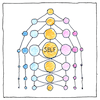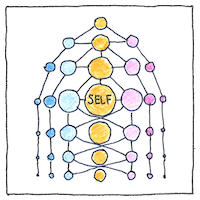Sewall Wright
sociobiology

|
Coefficient of relationship
Sewall Wright showed how to calculate the degree of relatedness between two people. The coefficient for a parent and child is 1; for two unrelated people, 0; for a grandparent and grandchild, 0.25; for full siblings, 0.5. You can use this number to determine the degree of inbreeding, the degree of kinship for genealogy, and Hamilton’s rule of altruism.
Genetic distance
Several means exist to measure genetic divergence, but Wright’s coefficient of relationship is not such a means or is at best only an approximation of genetic relatedness because a coefficient of relationship does not use genetic tests and when two living things produce an offspring by meiosis each chromosome is taken from only one parent at random. This is why siblings are different from each other; it’s not half of each parent; it’s random.
Being a Native American poet
I am a proud card-carrying member of a federally recognized tribe; however, my father was not an Indian. Only a genetic test could determine whether all my blood is Indian, like Mom, or none of it is, like Dad. If I were a Calvinist Indian, tribal membership would be like a Boy Scout merit badge; I would need to demonstrate a native inheritance. I had a friend who said that I was not an Native American poet because of what I write about but because I am a Native American.



According to Mendel’s law of independent assortment, “The zygote will normally end up with 23 chromosomes pairs, but the origin of any particular chromosome will be randomly selected from paternal and maternal chromosomes. This contributes to the genetic variability of progeny.”
See also in The book of science:
Readings in wikipedia: